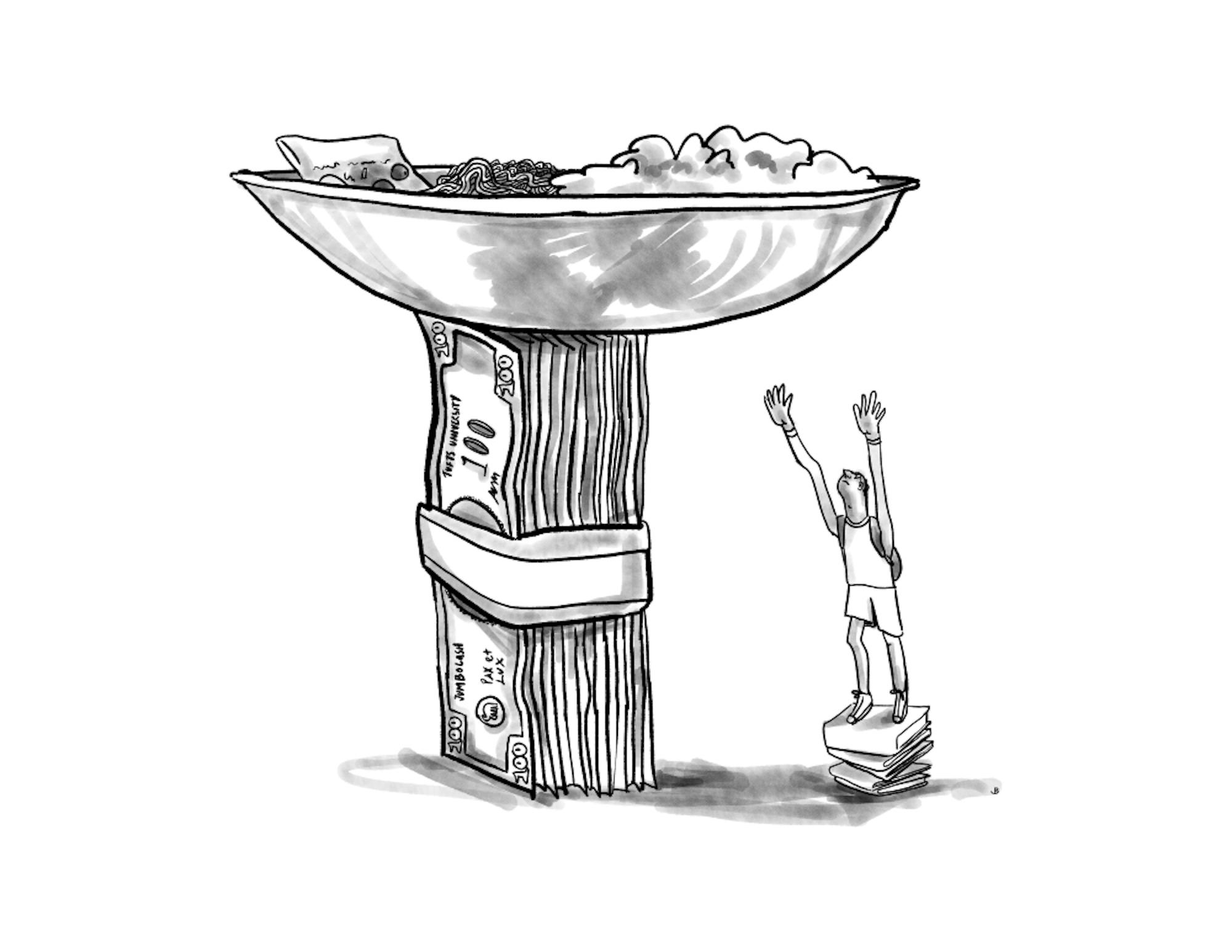Tufts students budget for a wide array of items every year — everything from textbooks to housing. In the past, student outcry about the high costs has initiated student-led solutions such as the Tufts Textbook Exchange. Though these initiatives can be effective in reducing the expenses they target, many other burdensome expenses still demand attention, and the onus cannot lie on students to address all of them. A persistent concern for some time now, food prices on the Tufts campus have gotten out of control, and require immediate critical discussion and action from our administrators.
Food costs affect all of us at Tufts, but fall especially hard on low-income students and upperclassmen living off campus.
Paying at either Carmichael or Dewick dining hall without a meal plan is $7.70 for breakfast and $16.02 for dinner for an all-you-can-eat buffet. A burrito meal at Hodgdon Food-on-the-Run is priced at $10.95, and if students want to add a granola bar, they end up having to pay out-of-pocket.A small cheeseburger and fries at Commons Marketplace runs at $7.58. A panini at Kindlevan Café costs $7.49.
For most students, these prices may seem average and many may not have trouble paying; 77% of Tufts students come from families whose incomes fall into the top 20% nationwide. However, to the remaining 23% of Tufts students these prices can be a significant barrier and source of consternation. For many, spending $16.02 to access a dining hall for dinner or spending nearly as much purchasing food, a drink and a side à la carte is simply not financially feasible.
A cost analysis comparing identical products sold at Hodgdon and bFresh in Davis Square reveals that prices at Hodgdon, on average, can be inflated by more than 117%. Paying for an item at Hodgdon that can be purchased for half the cost a mile away is unreasonable. More crucially, price gouging for à la carte options disproportionally disadvantages middle- and low-income students who sometimes cannot comfortably cover these costs. Compounded by the myriad other expenses students must account for, paying high prices for basic needs is unsustainable.
A survey about attitudes towards pricing at Tufts à la carte serveries was posted on Facebook and answered by 109primarily upperclassmen undergraduate students. The responses indicated that one-third of respondents allocate between $31 and $50 to their weekly food budget, and a little under a fifth of students spend less than $30 per week on food.For students who maintain these ranges, a single meal from Hodgdon or the dining hall that costs up to roughly $15 could conceivably consume anywhere from a fifth to a half of their weekly budget.A little over 50% of respondents indicated that they eat at an à la carte food court zero to two times a week. If a student that spends under $50 a week on food forgets to bring a meal from home one day during a busy class week, an extra on-campus meal beyond those they've planned for could put their budget under substantial strain.
A question about the pricing of food options at Tufts food courts was answered on a scale of one to five, with one denoting “not reasonably priced” and five denoting “reasonably priced.” The highest percentage of respondents, at around 40%, gave a two on the pricing scale. Just under 94% of respondents gave a three or less on the reasonable pricing scale, indicating that the overwhelming majority of respondents found prices on campus to be unaffordable. As an institution concerned with the success and wellbeing of its students, Tufts has an obligation to remedy this.
It is important to view pricing in the context of the larger issue of food insecurity on campus. SeniorMadeleine Clarkeconducted a literature review through Tufts Summer Scholars that examined the issue of food insecurity on university campuses. She and Marissa Donohue A19 have been granted funding by the Tufts Green Fund to conduct a Tufts food security assessmentthat will explore the status of food (in)security in the Tufts community and recommend action steps.In her literature review, Clarke found that students of color, LGBTQ students, first generation students, low-income students and recipients of financial aid, among other populations, are disproportionately affected by food insecurity. “In elite, higher education institutions like Tufts … overlooking food insecurity on these campuses runs the risk of overlooking the students who are dealing with it,” Clarke said.
It is essential that Tufts devotes attention and resources to the issue of food accessibility and insecurity on this campus. The administration must do more to demonstrate that it considers students of all backgrounds members of this community, and Tufts must ensure that the voices and experiences of these students do not go unheard. The Tufts administration must ensure that food, a basic human right, is accessible and affordable for everyone.
Editorial: Tufts must reduce costs of on-campus dining options to increase financial accessibility






